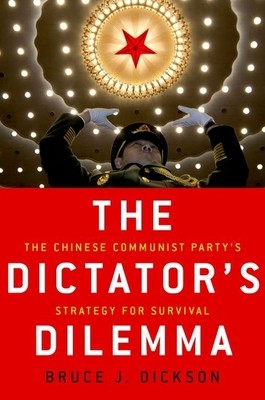
- We will send in 10–14 business days.
- Author: Bruce J Dickson
- Publisher: Oxford University Press, USA
- ISBN-10: 0190228555
- ISBN-13: 9780190228552
- Format: 15.8 x 23.6 x 3.3 cm, hardcover
- Language: English
- SAVE -10% with code: EXTRA
Reviews
Description
Many observers predicted the collapse of the Chinese Communist Party following the Tiananmen Square crackdown in 1989, and again following the serial collapse of communist regimes behind the Iron Curtain. Their prediction, however, never proved true. Despite minor setbacks, China has experienced explosive economic growth and relative political stability ever since 1989.
In The Dictator's Dilemma, eminent China scholar Bruce Dickson provides a comprehensive explanation for regime's continued survival and prosperity. Dickson contends that the popular media narrative of the party's impending implosion ignores some basic facts. The regime's policies may generate resentment and protest, but the CCP still enjoys a surprisingly high level of popular support. Nor is the party is not cut off from the people it governs. It consults with a wide range of specialists, stakeholders, and members of the general public in a selective yet extensive manner. Further, it tolerates and even encourages a growing and diverse civil society, even while restricting access to it. Today, the majority of Chinese people see the regime as increasingly democratic even though it does not allow political competition and its leaders are not accountable to the electorate. In short, while the Chinese people may prefer change, they prefer that it occurs within the existing politicalframework. In reaching this conclusion, Dickson draws upon original public opinion surveys, interviews, and published materials to explain why there is so much popular support for the regime. This basic stability is a familiar story to China specialists, but not to those whose knowledge of contemporary China is limited to the popular media. The Dictator's Dilemma, an engaging synthesis of how the CCP rules and its future prospects, will enlighten both audiences, and will be essential for anyone interested in understanding China's increasing importance in world politics.
EXTRA 10 % discount with code: EXTRA
The promotion ends in 16d.12:05:44
The discount code is valid when purchasing from 10 €. Discounts do not stack.
- Author: Bruce J Dickson
- Publisher: Oxford University Press, USA
- ISBN-10: 0190228555
- ISBN-13: 9780190228552
- Format: 15.8 x 23.6 x 3.3 cm, hardcover
- Language: English English
Many observers predicted the collapse of the Chinese Communist Party following the Tiananmen Square crackdown in 1989, and again following the serial collapse of communist regimes behind the Iron Curtain. Their prediction, however, never proved true. Despite minor setbacks, China has experienced explosive economic growth and relative political stability ever since 1989.
In The Dictator's Dilemma, eminent China scholar Bruce Dickson provides a comprehensive explanation for regime's continued survival and prosperity. Dickson contends that the popular media narrative of the party's impending implosion ignores some basic facts. The regime's policies may generate resentment and protest, but the CCP still enjoys a surprisingly high level of popular support. Nor is the party is not cut off from the people it governs. It consults with a wide range of specialists, stakeholders, and members of the general public in a selective yet extensive manner. Further, it tolerates and even encourages a growing and diverse civil society, even while restricting access to it. Today, the majority of Chinese people see the regime as increasingly democratic even though it does not allow political competition and its leaders are not accountable to the electorate. In short, while the Chinese people may prefer change, they prefer that it occurs within the existing politicalframework. In reaching this conclusion, Dickson draws upon original public opinion surveys, interviews, and published materials to explain why there is so much popular support for the regime. This basic stability is a familiar story to China specialists, but not to those whose knowledge of contemporary China is limited to the popular media. The Dictator's Dilemma, an engaging synthesis of how the CCP rules and its future prospects, will enlighten both audiences, and will be essential for anyone interested in understanding China's increasing importance in world politics.


Reviews